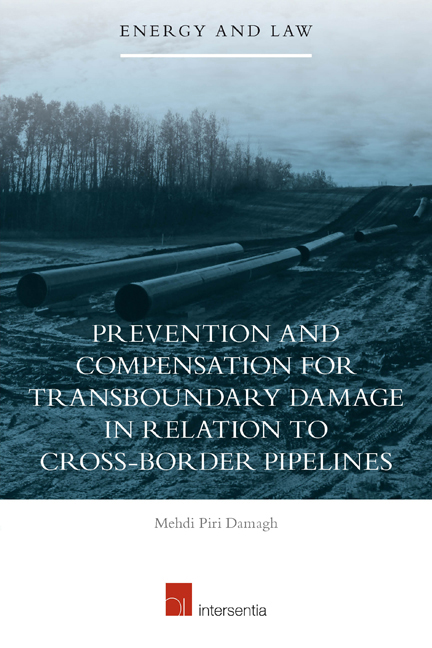Book contents
- Frontmatter
- Dedication
- Acknowledgements
- Contents
- Abbreviations
- List of Tables and Maps
- Chapter 1 Introduction
- PART I INTRODUCTORY ISSUES: PIPELINES, THE NATURE OF RISKS ASSOCIATED WITH PIPELINES AND THEIR REGULATORY REGIMES
- PART II PREVENTION OF CROSS-BORDER PIPELINE ACCIDENTS – MEANS AND SOURCES
- PART III STATE RESPONSIBILITY FOR TRANS-BOUNDARY DAMAGE CAUSED BY PIPELINES
- Introductory Note
- Chapter 8 The Origin of State Responsibility
- Chapter 9 Responsibility of States to Ensure Adequate Compensation for Transboundary Damage Caused by Oil and Gas Pipelines Laid under Their Jurisdiction and Control
- Chapter 10 Responsibility of States for Trans-boundary Damage Caused by the Prohibited Operation of Oil and Gas Pipelines
- Chapter 11 Conclusion and Policy Recommendations
- Summary
- Bibliography
- Valorisation Addendum
- Curriculum Vitae
Chapter 11 - Conclusion and Policy Recommendations
from PART III - STATE RESPONSIBILITY FOR TRANS-BOUNDARY DAMAGE CAUSED BY PIPELINES
Published online by Cambridge University Press: 13 December 2017
- Frontmatter
- Dedication
- Acknowledgements
- Contents
- Abbreviations
- List of Tables and Maps
- Chapter 1 Introduction
- PART I INTRODUCTORY ISSUES: PIPELINES, THE NATURE OF RISKS ASSOCIATED WITH PIPELINES AND THEIR REGULATORY REGIMES
- PART II PREVENTION OF CROSS-BORDER PIPELINE ACCIDENTS – MEANS AND SOURCES
- PART III STATE RESPONSIBILITY FOR TRANS-BOUNDARY DAMAGE CAUSED BY PIPELINES
- Introductory Note
- Chapter 8 The Origin of State Responsibility
- Chapter 9 Responsibility of States to Ensure Adequate Compensation for Transboundary Damage Caused by Oil and Gas Pipelines Laid under Their Jurisdiction and Control
- Chapter 10 Responsibility of States for Trans-boundary Damage Caused by the Prohibited Operation of Oil and Gas Pipelines
- Chapter 11 Conclusion and Policy Recommendations
- Summary
- Bibliography
- Valorisation Addendum
- Curriculum Vitae
Summary
INTRODUCTION
This thesis aimed to investigate the prevention and compensation of transboundary damage resulting from the construction and operation of oil and gas pipelines. Five research questions were identified in Chapter 1:
What are the potential harms associated with cross-border oil and gas pipelines?
What is the international legal regime applicable to cross-border pipelines?
What are measures used to prevent and reduce damage which may be caused by cross-border pipelines?
Is the current international legal regime applicable to cross-border and cross-country pipelines designed in such a way that it enables an effective prevention of trans-boundary damage?
Under which conditions can states be held responsible for transboundary damage caused by pipelines?
In this Chapter, the key findings of this study are presented along the research questions reflecting the purpose of this thesis. In order to answer the research questions, this thesis employed different research methodologies. A comprehensive literature review and a systematic elaboration of the international legal regime governing cross-border pipelines have been carried out to answer research questions. Furthermore, economic analysis of law has been used to evaluate the design of environmental and safety regulations applicable to such pipelines.
CONCLUDING REMARKS
RISKS ASSOCIATED WITH PIPELINES
The first research question of the thesis concerns the risk associated with the construction and operation of oil and gas pipelines, in particular the possibility of occurrence of trans-boundary damage. In the thesis, an overview of data regarding the number of gas and oil pipeline accidents was provided. By considering the published data, it can be argued that, pipelines have not led to many accidents. Of course, the current number is still considerable. Furthermore, although the number of accidents is high enough to call pipelines hazardous activities, they have not frequently led to transboundary damage. However, as accident reports indicate, pipelines have the potential to cause personal injuries, environmental damage and economic losses in the trans-boundary context. A brief overview of the contribution of various causes of failure has been conducted in the thesis. It was revealed that external impacts and technical defects are the main failure causes in both oil and gas pipelines, although they slightly differ.
- Type
- Chapter
- Information
- Prevention and Compensation for Transboundary Damage in Relation to Cross-border Oil and Gas Pipelines , pp. 425 - 436Publisher: IntersentiaPrint publication year: 2015

